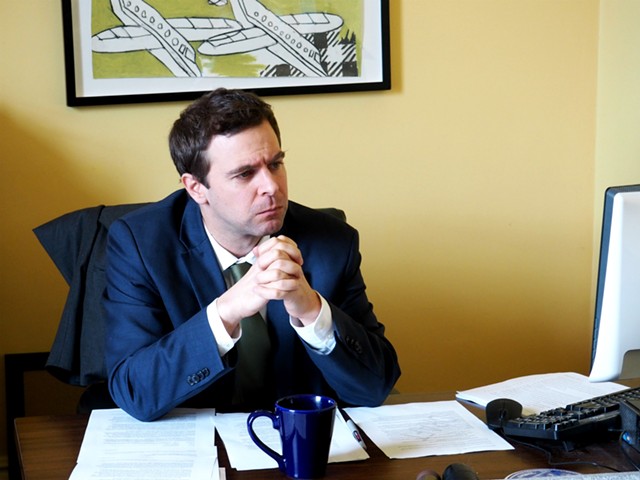click to enlarge 
- Taylor Dobbs
- Senate President Pro Tempore Tim Ashe (D-Chittenden)
Vermont Senate leaders expressed surprise and disappointment Tuesday morning after Gov. Phil Scott vetoed a bill designed to protect children from toxic chemicals in consumer products. Scott’s veto was the first of the 2018 legislative session.
The legislation,
S.103, would have given the commissioner of the Vermont Department of Health expanded power to enter products into a state-run database if they contain toxins that may harm children. It also would have made that database publicly searchable by products’ bar codes.
In a statement announcing his decision Monday, Scott said he opposes the bill because it wouldn’t improve Vermont’s already high consumer safety laws, which were last updated in 2014, as well as put a harmful burden on businesses and manufacturers.
“These [proposed] changes, in my opinion, have no practical impact to how my Administration regulates these chemicals,” he said.
In a letter to the Senate about the veto, Scott said he was concerned that the bill would “jeopardize jobs and make Vermont less competitive for businesses.”
Senate President Pro Tempore Tim Ashe (D/P-Chittenden) wasn't buying it.
“The theme through this is that the fundamental difference [between the legislature and the governor] is the executive branch apparently want[s] to better commandeer the policymaking towards possible industry allies or something,” Ashe said.
Scott said he would be open to approving a bill with changes specified in his letter to the Senate, including the removal of a provision that would allow the Health Department commissioner to require labeling, or even ban certain products, if they are found to contain toxins. The governor wrote that the bill would make Vermont "a less friendly place for the manufacturers to locate and sell their products here."
Ashe said Tuesday that he and other legislative leaders “don’t see that the public health is served” by Scott’s proposed changes.
“We’re still trying to understand the why of the veto before we decide whether we’d have an override vote or try to work through small differences,” Ashe said. Overriding a governor's veto requires two-thirds of the Senate (20 votes) and two-thirds of the House (100 votes).
Sen. Brian Campion (D-Bennington) said the veto shows a disregard for what people in Bennington, affected by toxic industrial waste in their water, are going through.
Campion said he’s never considered Scott a “real environmentalist,” but he expected him to support the measure.
“What was really disappointing is the governor has talked so much about protecting Vermont’s most vulnerable,” Campion said, “and clearly in the budget he has put forward, [he] is not protecting the most vulnerable, and with this legislation by vetoing it, is in my opinion another example of not sticking by his words on this.”
The toxics bill was introduced early last year and passed the Senate last March. The House gave it final approval in March of this year.
Another bill concerning toxic chemicals that is wending its way through the Statehouse this year would
make it easier for Vermonters to hold polluters accountable in the future. That legislation has passed the Senate and is under consideration in the House Judiciary Committee.
Disclosure: Tim Ashe is the domestic partner of Seven Days
publisher and coeditor Paula Routly. Find our conflict-of-interest policy here: sevendaysvt.com/disclosure.























































